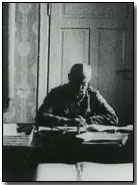Primary Documents - Erich Ludendorff on German Losses at the Third Battle of Ypres, 1917
 Reproduced below is the
text of
Erich Ludendorff's memoirs regarding the
Third
Battle of Ypres in the autumn of 1917. Ludendorff, together
with Chief of Staff
Paul von Hindenburg, oversaw
Germany's war strategy from August 1916 until the war's close.
Reproduced below is the
text of
Erich Ludendorff's memoirs regarding the
Third
Battle of Ypres in the autumn of 1917. Ludendorff, together
with Chief of Staff
Paul von Hindenburg, oversaw
Germany's war strategy from August 1916 until the war's close.
In his account below he emphasised the high degree of strain the British-led attack placed upon German forces, not just in the west but indirectly also in the east. He credited the British forces with sustained success - a view that is not commonly reflected today, with Third Ypres considered a minor Allied success achieved at significant cost in casualties. The Allies incurred some 310,000 casualties, the Germans 260,000. The salient had been re-widened by several kilometres.
Sir Douglas Haig, the British Commander-in-Chief, himself believed that the Germans could less afford the heavy loss in men than the Allies, a view apparently supported by Ludendorff. Click here to read General Sir John Davidson's arguments supporting Haig's strategy; Davidson served on Haig's GHQ staff during the battle. Click here to read Canadian General Sir David Watson's assessment of the battle.
Erich Ludendorff on the Third Battle of Ypres
The fighting on the western front became more severe than any the Germany army had yet experienced.
In the east we had to keep on hammering at Russia in order to bring about the fall of the Colossus. From the 31st of July till well into September was a period of tremendous anxiety.
On the 31st of July the English, assisted by a few French Divisions on their left, had attacked on a front of about 31 kilometres, but besides the loss of from two to four kilometres along the whole front, it caused us very heavy losses in prisoners and stores, and a heavy expenditure of reserves.
On the 16th we sustained another great blow. The English pressed on beyond Poelcapelle, and even with an extreme exertion of strength on our part, could only be pushed back a short distance. It had cost us heavily.
The costly August battles imposed a heavy strain on the Western troops. In spite of all the concrete protection they seemed more or less powerless under the enormous weight of the enemy's artillery. At some points they no longer displayed that firmness which I in common with the local commanders had hoped for.
The enemy managed to adapt himself to our method of employing counter-attack Divisions. There were no more attacks with unlimited objectives, such as General Nivelle had made in the Aisne-Champagne battle. He was ready for our counter-attacks and prepared for them by exercising restraint in the exploitation of success.
I was myself being put to a terrible strain. The state of affairs in the West appeared to prevent the execution of our plans elsewhere. Our wastage had been so high as to cause grave misgivings and exceeded all expectation. The attack on the Dvina had to be postponed repeatedly . Indeed, it became a question whether we could continue to bear the responsibility of retaining those Divisions in the East.
After a period of profound quiet in the West, which led some to hope that the battle of Flanders was over, another terrific assault was made on our lines on the 10th of September. The third bloody act of the battle had begun. The main force of the attack was directed against the Passchendaele-Gheluvelt line.
Obviously the English were trying to gain the high ground between Ypres and the Roulers-Menin line, which affords an extensive view in both directions. These heights were also exceptionally important for us, as they afforded us ground observation posts and a certain amount of cover from hostile view.
The enemy's onslaught on the 10th was successful, which proved the superiority of the attack over the defence. The power of the attack lay in the Artillery, and in the fact that ours did not do enough damage to the hostile Infantry as they were assembling, and, above all, at the actual time of the assault.
Another English attack on the 21st was repulsed; but the 26th proved a day of heavy fighting, accompanied by every circumstance that could cause us loss. We might be able to stand the loss of ground, but the reduction of our fighting strength was again all the heavier.
Once more we were involved in a terrific struggle in the West. October came and with it one of the hardest months of the war. I had not known what joy meant for many a long day.
The actions of the Third battle of Flanders had presented the same set-piece characteristics. The depth of penetration was limited so as to secure immunity from our counter-attacks, and the latter were then broken up by the massed fire of the Artillery. As regards the battle on the 4th of October, again we only came through it with enormous loss.
The wastage in the big actions of the fourth Battle of Flanders was extraordinary high. In the West we began to be short of troops. Two Divisions that had been held in readiness in the East and were already on their way to Italy were diverted to Flanders.
The Italian operation could not be started before the 22nd, and the weather held it up until the 24th. These days were the culminating point of the crisis.
Source: Source Records of the Great War, Vol. V, ed. Charles F. Horne, National Alumni 1923
Duck-Boards comprised slatted wooden planking used for flooring trenches or muddy ground.
- Did you know?
